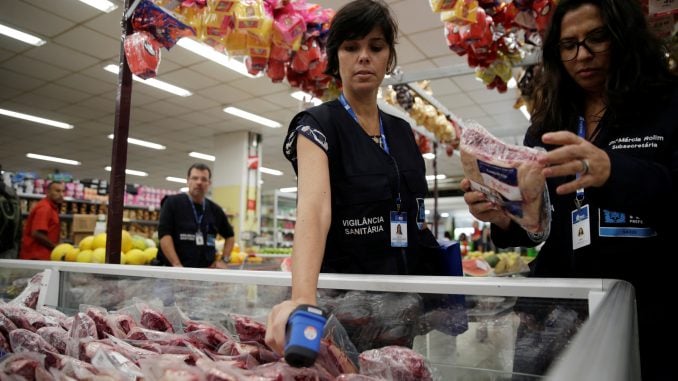
CHICAGO – The U.S. Department of Agriculture has started testing all shipments of raw beef and ready-to-eat products from Brazil for pathogens, an agency spokeswoman said on Monday, as fallout from a meatpacking industry scandal there widened. China, the European Union, South Korea and Chile curtailed meat imports from Brazil, the world’s biggest beef exporter, after inspectors were accused of taking bribes to allow sales of tainted food. Fallout from a meatpacking industry scandal in Brazil, the world’s biggest exporter of beef and poultry, widened on Monday as China, the EU, South Korea and Chile curtailed meat imports. With other import curbs expected to follow, the scandal stemming from a Brazilian police operation codenamed “Weak Flesh” could deal a heavy blow to one of the few sectors of Latin America’s largest economy that has thrived during a two-year recession. The police investigation of Brazil’s meatpacking industry is the latest to cast a spotlight on unsavory business practices in the country. Brazil is still reeling from massive graft scandals involving state-controlled oil company Petrobras and construction and engineering firm Odebrecht. Police on Friday named BRF SA and JBS SA , along with dozens of smaller rivals, in a two-year probe into how meatpackers allegedly paid off inspectors and politicians to overlook practices including processing rotten meat and shipping exports with traces of salmonella. JBS is the world’s largest meat producer and BRF the biggest poultry exporter. The companies have denied any wrongdoing, and authorities have said no cases of death or illness have been linked to the tainted meat investigation. Brazil’s President Michel Temer has sought to downplay the scandal, saying it involved only 21 of Brazil’s more than 4,800 meat processing units. But Francisco Turra, head of Brazilian beef producers association ABPA, told reporters it had put the entire meat industry in jeopardy and “destroyed” a hard-won image of quality products. China, which accounted for nearly one-third of the Brazilian meatpacking industry’s $13.9 billion in exports last year, suspended imports of all meat products from Brazil as a precautionary measure. The European Union suspended imports from four Brazilian meat processing facilities, ABPA said Monday, citing the nation’s agriculture ministry. Ricardo Santin, ABPA’s vice president of markets, said two of the suspended plants process poultry, one beef and the other horse meat. One of the poultry plants is operated by BRF, said Santin. In a statement, BRF said the company has not received any formal notice from Brazilian or foreign authorities related to the suspension of its plants. Brazil’s agriculture ministry did not immediately respond to requests for comment. South Korea’s agriculture ministry said in a statement that it would tighten inspections of imported Brazilian chicken meat and temporarily bar sales of chicken products by BRF. More than 80 percent of the 107,400 tonnes of chicken that South Korea imported last year came from Brazil, and BRF supplied almost half of that. The scandal “could be enough to compromise temporarily Brazilian protein’s acceptance worldwide,” Credit Suisse Securities analyst Victor Saragiotto wrote in a Monday note to clients. Chile is temporarily banning imports of all Brazilian meat products, the agriculture ministry said on Monday. The European Commission said the scandal would not affect negotiations between the European Union and South American bloc Mercosur about agreements on free trade.



